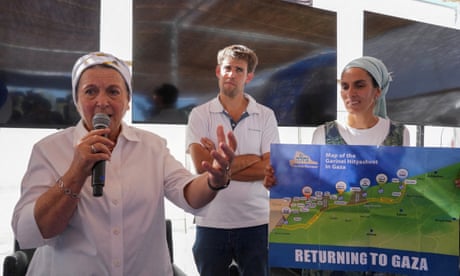Reformist clerics imply Iran should back two-state solution for Israel and Palestine
In shift that would mean recognising existence of Israel, assembly calls for ‘formation of an independent Palestinian state’
Reformists in Iran have ignited a debate about whether Tehran should be willing to shift from its deeply held opposition to a two-state solution in the Palestinian territories, which would require it to recognise the existence of an Israeli state.
“Death to Zionism” has been a staple of Iranian revolutionary thinking since 1979, and was the position effectively of the Palestine Liberation Organisation until the Oslo accords in the 1990s.
Under the former president Mohammad Khatami and his foreign minister Kamal Kharazi, Iran proposed a referendum on a one-state solution, with only descendants of those who lived there “before the Zionist invasion” and Palestinian refugees being permitted to vote – a process that would leave Israeli Jews largely outnumbered in the vote.
Iran has always seen Israel as a colonial enterprise of settlers, and some of its leaders have championed outright Holocaust denial. Last week Iran did not attend a two-day meeting of an international coalition for a two-state solution held in Riyadh, Saudi Arabia.
However, on 21 October, the assembly of lecturers and scholars at Qom Seminary, a reformist-leaning body of clerics, issued a statement calling for the “return of the Zionist regime to its legal borders prior to the 1967 aggression and formation of an independent Palestinian state”.
This implied support for a two-state solution led to protests outside the assembly’s offices, in Qom, after Friday prayers. The Tehran-based hardline daily Kayhan labelled the assembly a “propaganda machine for the enemy” and characterised its “recognition of the fabricated regime of Israel” as “despicable and shameful”. The head of the judiciary also criticised the statement, saying corrective action was required, implying closure may be necessary. But reformist newspapers reported the statement sympathetically.
In response to the criticism, the seminary relented only to the extent that it clarified that it understood “the heinous crimes of the Zionist state” and did not recognise Israel, but believed an independent Palestinian state would bring the bloodshed to an end.
Iran’s opposition to a two-state solution has made it harder for it to build diplomatic alliances in the region – its absence from last week’s conference is a case in point.
The historian and author Arash Azizi denied that the backdrop of possible imminent military conflict between Israel and Iran made it a totally inappropriate moment for such a debate to be held.
“It is a debate between those that want Iran to be an incubator of revolutionary Islamist anti-Zionism, and those that support a pragmatic foreign policy based on the national interest,” he said. “Iran is going through a transition. The supreme leader is 85. Power is being passed on to a new generation. Iran cannot go on in these full-out crises. Khomenei’s strategy of no war no peace has not worked. It should not be Iran’s business to want to destroy Israel, and then say it does not want war. This is a moment of truth.”
He added that “if there was a Palestinian-Israeli agreement, Iran would not be able to do much”.
Azizi said the former Iranian foreign minister Mohammed Javad Zarif recently said Iranians were tired of a government “that is trying to be more pro-Palestinian than the Palestinians themselves”.
The possible flexibility in the Iranian position started under the last president, Ebrahim Raisi. In December, for instance, Iran backed a Jordanian-tabled resolution at the UN general assembly – albeit with a heavy reservation – that declared a two-state solution was the only way to resolve the Palestinian-Israeli conflict.


Geen opmerkingen:
Een reactie posten
Opmerking: Alleen leden van deze blog kunnen een reactie posten.